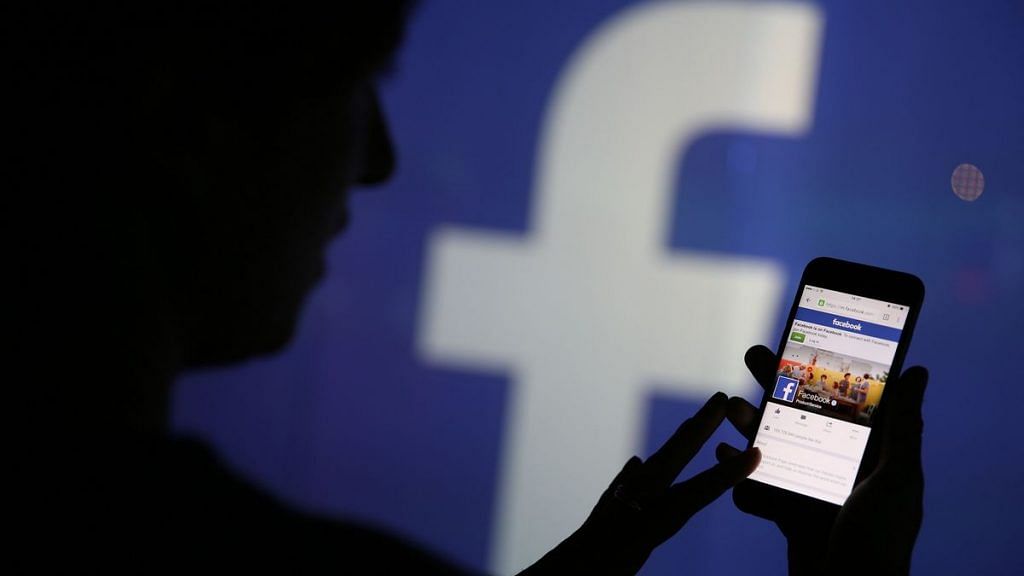New Delhi: Facebook India turned a blind eye to hate speech by a BJP leader and three other “Hindu nationalist individuals and groups” to avoid damaging the social media platform’s business prospects in its biggest market, The Wall Street Journal reported this week.
In a 14 August report headlined “Facebook’s Hate-Speech Rules Collide With Indian Politics”, The Wall Street Journal has quoted former and current Facebook employees as saying that the aforementioned accounts, flagged for “promoting or participating in violence”, were spared a ban at the intervention of the company’s top public policy executive in the country, Ankhi Das.
Reached for comment by ThePrint, Facebook sought to reject the notion that political compulsions were a factor in its decision-making. Facebook said it prohibits “hate speech and content that incites violence and we enforce these policies globally without regard to anyone’s political position or party affiliation”.
The BJP leader cited in the WSJ report is Telangana MLA T. Raja Singh, who has been associated with multiple provocative social media posts against Muslims. “The current and former Facebook employees said Ms. Das’s intervention on behalf of Mr. Singh is part of a broader pattern of favoritism by Facebook toward Mr. Modi’s Bharatiya Janata Party and Hindu hard-liners,” the report adds.
According to the report, Facebook spokesperson Andy Stone “acknowledged that Ms. Das had raised concerns about the political fallout that would result from designating Mr. Singh a dangerous individual, but said her opposition wasn’t the sole factor in the company’s decision to let Mr. Singh remain on the platform”.
“The spokesman said Facebook is still considering whether a ban is warranted,” the report added, quoting Facebook as saying that Singh “is no longer permitted to have an official, verified account, designated with a blue check mark badge.
Neither Das, Singh, nor the BJP responded to requests for comment from the WSJ, the newspaper said, adding that the Prime Minister’s Office spokesperson declined to comment.
The WSJ report comes as global social media giants find themselves under deepening pressure to crack down on hate speech, which is routinely blamed for triggering actual violence. The role of social media hate speech has been alleged to be a factor in the two most recent episodes of communal frenzy in India, namely, the Delhi and Bengaluru riots. In the US, Facebook’s perceived failure to control hate speech has spawned a boycott campaign involving some of the country’s top advertisers.
The WSJ report claims that some of Singh’s controversial posts were removed by Facebook after its reporters raised queries about them. Similar charges have been made about posts made by two other controversial BJP leaders — Kapil Mishra and MP Anantkumar Hegde — who are known for frequent provocative remarks on social media.
A February speech by Mishra — threatening vigilante action against anti-Citizenship Amendment Act protesters in northeast Delhi, hours before the area erupted in riots — was cited by Facebook CEO Mark Zuckerberg as a textbook example of hate speech..
As he sought to assuage employees’ concerns about Facebook’s alleged inaction on hate speech, Zuckerberg said they had removed a video of the speech uploaded by Mishra.
In the email response to ThePrint, Facebook said it acts against hate speech but acknowledged that more needs to be done. “While we know there is more to do, we’re making progress on enforcement and conduct regular audits of our process to ensure fairness and accuracy.”
Also Read: Zuckerberg uses Kapil Mishra’s ‘Delhi riots threat’ to outline Facebook’s hate speech policy
Its biggest market
The WSJ report starts with a mention of Facebook posts and public appearances where Singh has “(said) Rohingya Muslim immigrants should be shot, called Muslims traitors and threatened to raze mosques”. Another post cited is a call to “slaughter” Muslims who kill cows, an animal sacred to Hindus.
The report then quotes former and current employees as saying that, by March 2020, they had decided that Singh warranted the company’s “dangerous” label — a designation that reportedly also takes into account an individual’s “off-platform” activities and has resulted in Facebook bans for white supremacist organisations, Right-wing conspiracy theorist Alex Jones, and American Islamic extremist Louis Farrakhan.
Das, however, “opposed applying hate-speech rules” to Singh and “at least three other Hindu nationalist individuals and groups” flagged by employees for promoting violence.
“Ms. Das, whose job also includes lobbying India’s government on Facebook’s behalf, told staff members that punishing violations by politicians from Mr. Modi’s party would damage the company’s business prospects in the country, Facebook’s biggest global market by number of users, the current and former employees said,” the report adds.
Facebook has close to 300 million users in India, with its chat platform WhatsApp accounting for 400 million subscribers. The company is also awaiting government nod to tap India’s burgeoning digital payments market, and looking to establish a wider presence as part of its $5.7 billion partnership with Reliance Jio.
Also Read: ‘Hate speech continues on social media’: Ex-RSS ideologue moves HC against Facebook, Twitter
